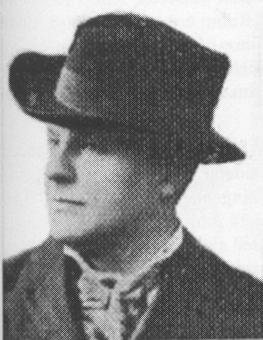Paul Struensee
Paul Struensee was born Paul Kallensee. Kallensee studied with the baritone Georg Brandes and made his debut in Strasbourg
as a baritone
in 1902. After that, Kallensee went to Kiel, where he met his future wife, the coloratura soprano Olga von Sturen.
She advised him that he could be
a tenor and recommended that he further study with Benno Stolzenberg in Berlin. After a year, he felt that he was ready to
sing again. He began his new career as Paul Struensee (taking inspiration from his wife's maiden name, while she became now
Olga Kallensee) in 1904 in Augsburg, in spite of the opposition from his teacher. In
1905, he was in Altenburg singing Raoul, Vasco, Éléazar, Masaniello, Canio, Hüon, Manrico, Loge, Faust, Siegmund,
Tannhäuser and Lohengrin, in spite of not having the necessary technique to sing those parts. In 1905, Struensee
left Altenburg, went to Koblenz
and then to Mainz in 1907, where he caused a sensation with his interpretation of the young Siegfried. In 1911, he sang all
four tenor leads in the Ring cycle in Magdeburg. According to Max Hasse in Musik, he sang without tiring, with
good voice and excellent acting. Soon Struensee's method of singing on his capital resulted in vocal detoriation. Already
in 1912, he was criticized for pushing, flatness and resulting exhaustion.
In 1913, Struensee moved to Darmstadt. He sang mostly Wagner parts in
Southern Germany without any big break. In 1915, Struensee volunteered to the army and became an ambulance driver.
In 1919,
he went back to Darmstadt, and in 1921 to Königsberg, where his wife had a contract while he sang in the chorus. In 1923, he
moved to Berlin, where he sang in the chorus, as well (at the Deutsche Oper) – for the last time in Le prophète
on December 25th, 1930. He died suddenly on January 2nd, 1931.
Source: Einhard Luther, So viel der Helden. Biographie eines Stimmfaches, Teil 3: Wagnertenöre der Kaiserzeit,
(1871–1918), Berlin 2006
In 1921, Paul Struensee played a role in a silent movie for children, Der kleine Muck.
|
